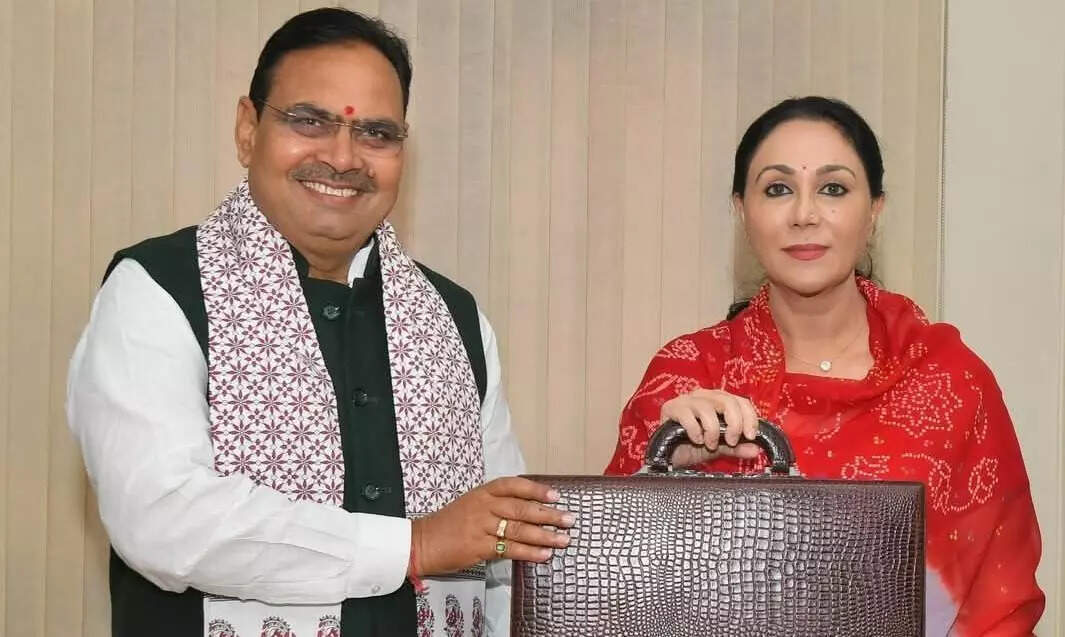
February 19, Jaipur: The Rajasthan Budget 2025-26 was presented by Diya Kumari, Deputy Chief Minister and Finance Minister, at the Rajasthan Legislative Assembly. The budget prioritizes infrastructure, employment, sustainability, and social welfare.
Bhajan Lal Sharma, Chief Minister of Rajasthan, described the budget as a significant step toward achieving PM Narendra Modi’s vision, with 58% of the Sankalp Patra promises fulfilled within a year. Rajasthan’s first Green Budget has allocated 11.34% of total funds to sustainability initiatives.
Major provisions include supplying drinking water to 20 lakh homes, increasing the Kisan Samman Nidhi to ₹9,000 per year, and raising the Minimum Support Price (MSP) bonus for wheat. The budget also focuses on employment generation, aiming to create 1.25 lakh government jobs and 1.5 lakh private-sector jobs.
Key initiatives have been introduced in women’s empowerment, healthcare, and tourism, with a ₹3,500 crore fund allocated to these sectors.
Salient Features of Rajasthan Budget 2025-26:
- Green Budget Initiative: 11.34% of total funds allocated to sustainability.
- Infrastructure Development: 9,600 km of new roads and upgrades to 13,000 km of existing roads.
- Drinking Water Supply: ₹400 crore allocated for two lakh new household connections.
- Expressway Development: Nine greenfield expressways planned with an estimated cost of ₹60,000 crore.
- Employment Generation: 1.25 lakh government and 1.5 lakh private-sector jobs.
Agriculture Support:
- Kisan Samman Nidhi increased to ₹9,000 per year.
- ₹150 MSP bonus on wheat.
- ₹25,000 crore in interest-free crop loans.
- Expansion of the Gopal Credit Card scheme for dairy farmers.
Renewable Energy Initiatives:
- PM Suryaghar Free Electricity Scheme to cover 150 units.
- Community solar projects introduced.
- 50,000 new agricultural and five lakh domestic electricity connections.
- 6,400 MW increase in electricity production.
- 10 GW renewable energy expansion.
- 180 new grid substations to be established.
Social Welfare Measures:
- Pension increased to ₹1,250 for elderly, widows, single women, disabled persons, and small farmers.
- ₹150 crore allocated for artificial limb assistance.
- Expansion of Swayamsiddha Ashrams.
- Dadudayal Ghumantu Empowerment Scheme introduced.
- Mess allowance for residential institutions raised to ₹3,250 per month.
Irrigation and Water Management:
- ₹9,416 crore for Ram Jal Setu Link Project (Revised PKC-ERCP).
- ₹12,064 crore in tenders issued for irrigation projects.
- Rajasthan Irrigation Water Grid Mission to receive ₹4,000 crore.
Major irrigation projects:
- ₹2,250 crore for Manoharthana Major Irrigation.
- ₹950 crore for Dholpur Lift and Kalitir Projects.
- ₹590 crore for canal reconstruction in Hanumangarh.
- Tourism & Cultural Development: ₹3,500 crore allocated for tourism, heritage conservation, and cultural promotion.
Diya Kumari, Deputy Chief Minister and Finance Minister, stated that Rajasthan’s GDP is projected to exceed ₹19,89,000 crore in 2025-26, with a long-term goal of transforming into a $350 billion economy by 2030. Capital expenditure has increased by 40%, leading to the construction of key infrastructure projects. She also highlighted that 58% of the election promises and 73% of previous Budget announcements have been fulfilled.Heeralal Nagar, Energy Minister, emphasized the budget’s focus on renewable energy and public welfare. The PM Suryaghar Free Electricity Scheme will now cover 150 units of free electricity, along with the introduction of community solar projects and new agricultural and domestic connections.
Additionally, the government has planned an increase of 6,400 MW in electricity production and the establishment of 180 new grid substations. The budget also reinforces employment initiatives, agriculture benefits, and infrastructural development, including the construction of ring roads in 15 cities to enhance connectivity.
Gautam Kumar Dak, Minister of State for Cooperation, outlined key provisions supporting Rajasthan’s cooperative sector under Chief Minister Bhajanlal Sharma’s leadership. The Kisan Samman Nidhi has been increased to ₹9,000, while farmers will receive a ₹150 wheat bonus and benefit from ₹25,000 crore in interest-free crop loans.
The Gopal Credit Card scheme has been expanded to further support dairy farmers. The budget also facilitates rural economic growth by establishing Gram Seva Cooperative Societies in 2,500 Gram Panchayats and purchase-sale cooperative associations in eight new districts.
Avinash Gehlot, Social Justice and Empowerment Minister, hailed the budget as inclusive and historic, particularly for its welfare provisions. The pension for elderly individuals, widows, single women, disabled persons, and small farmers has been raised to ₹1,250. The government has also expanded Swayamsiddha Ashrams, allocated ₹150 crore for artificial limb assistance, and introduced the Dadudayal Ghumantu Empowerment Scheme.
The mess allowance for residential institutions has been increased to ₹3,250 per month. Gehlot highlighted initiatives in social justice, health, education, and infrastructure, calling the budget a significant step toward Rajasthan’s development and public welfare.
Suresh Singh Rawat, Water Resources Minister, affirmed the government’s commitment to Rajasthan’s comprehensive development. He stated that the budget ensures social and economic progress through an inclusive approach while aligning with PM Narendra Modi’s vision for a developed India-2047. As part of Rajasthan’s first Green Budget, the government has prioritized renewable energy and environmental conservation.
A key highlight is the Ram Jal Setu Link Project (Revised PKC-ERCP) for eastern Rajasthan, with ₹9,416 crore in work orders and ₹12,064 crore in tenders issued. The Rajasthan Irrigation Water Grid Mission will transform ERCP Corporation into Rajasthan Watergrid Corporation with ₹4,000 crore allocated. Other major irrigation projects include ₹2,250 crore for Manoharthana Major Irrigation, ₹950 crore for the Dholpur Lift and Kalitir Projects, and ₹590 crore for canal reconstruction in Hanumangarh, ensuring sustainable water management across the state.
The Rajasthan Budget 2025-26 presents a bold vision for growth, sustainability, and welfare, emphasizing long-term economic development while addressing immediate social needs.


